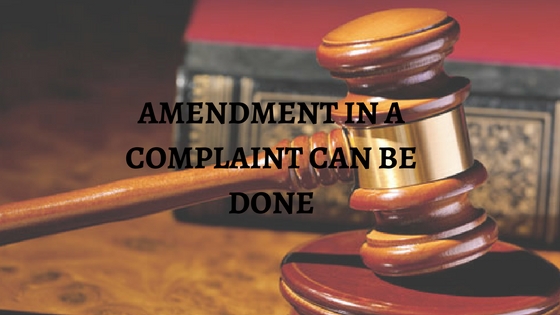Aapka Consultant Judgment Series- In this series, we are providing case analysis of Landmark Judgments of Hon’ble Supreme Court of India.
R. Sukumar v. S. Sunaad Raghuram
AIR 2015 SC 2757
JUDGES: T. S. Thakur and R. Banumathi
Date of Decision: 02-07-2015
FACTS:-
This appeal by special leave has been arisen out of an order passed by the High Court of Karnataka wherein the High Court declined to quash the order and confirmed the order passed by the Addl. Chief Metropolitan Magistrate, Bangalore permitting the respondent to carry out the amendment in a criminal complaint on the premise that the amendment was made prior to taking cognizance of the offence.
ISSUE:-
Whether the amendment to a complaint filed under Section 200 Cr. P.C. is permissible in law?
JUDGMENT:-
The Hon’ble Supreme Court has observed that the language in Section 200 of the Code of Criminal Procedure, 1973 “a Magistrate taking cognizance of an offence on complaint shall examine upon oath the complainant and the witnesses present, if any…” clearly contemplates that for taking cognizance on a complaint, the Court shall examine the complainant on oath. The object of examination of the complainant is to find out whether the complaint is justifiable or vexatious. Merely because the complainant was examined that does not mean that cognizance of the offence has been taken by the Magistrate. Taking cognizance of an offence means the Magistrate have applied his judicial mind to the contents of the complaint and indicates that Magistrate takes judicial notice of an offence.
“Cognizance” therefore has a reference to the application of the judicial mind in connection with the commission of an offence and not merely learning that some offence had been committed. Under Section 200 Cr. P.C., when the complainant has been examined, the Magistrate cannot be said to have ipso facto taken the cognizance, when the Magistrate was merely gathering material on records on the basis of which he will decide whether a prima facie case has been made out for taking cognizance of the offence or not. Hon’ble Court said that “Cognizance of offence” means taking notice of the accusations and applying the judicial mind to the contents of the complaint and the material filed therewith”.
The Court further observed that if the amendment sought to be made relates to simple infirmity which is curable by a formal amendment and by allowing such amendment, no prejudice could be caused to other side, then notwithstanding the fact that there is no enabling provision regarding the amendment of the complaint, the Court may permit such amendment to be made. On the contrary, if the amendment does not relate to simple infirmity or which is not curable by a formal amendment or it will cause prejudice to the other party, then the Court shall not allow such amendment in the complaint.
HELD:-
The Court has held that amendment to the complaint filed under Section 200 of Cr. P.C. is permissible in law even if there is no enabling provision under the code to do the same. It can be allowed if no prejudice would be caused to the other party and the original nature of the complaint is not going to change.
To Get Legal Opinion from Advocates/ Legal Experts, Please click here
To Get Legal Opinion from Retired Hon’ble Judges, Please click here












